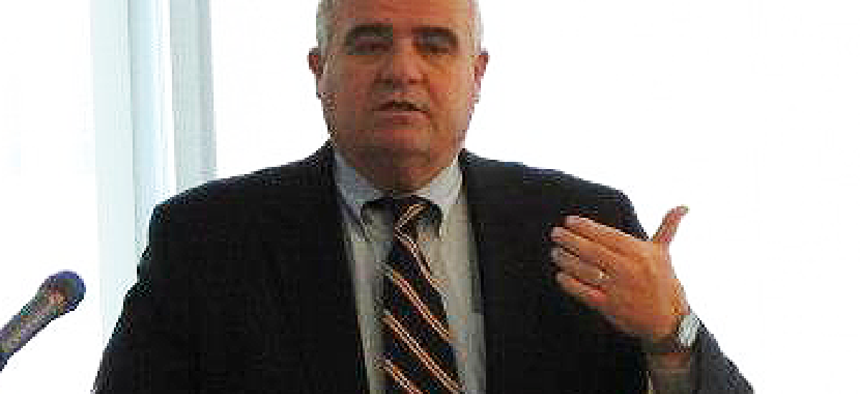The key to performance improvement

A panel discusses what it will really take to improve the performance of government during the president's second term.

Edward Deseve, speaking at the "Memos to National Leaders" event, says the three sets of recommendations coming from the series address the important things the public expects from the government. (Photo courtesy of NAPA)
Governance is the key to improving the federal government’s performance, according to speakers at the fourth and final installment in a joint project between the National Academy of Public Administration and the American Society for Public Administration called “Memos to National Leaders.”
The recommendations are not for radical changes, but for making better use of government tools and personnel already available.
“If we’re interested in improving the performance of government in the 21st century, we’re probably going to be more focused on governance than government,” said Christopher Mihm, Managing Director of Strategic Issues for the Government Accountability Office, speaking at the event held Nov. 9.
Mihm and G. Edward Deseve, deputy director of management for the Office of Management and Budget, drew parallels between the three sets of recommendations regarding large-scale presidential initiatives, fiscal strategy partnerships and creating a performance-driven federal government.
“When you look across these papers, it shows a deep understanding and appreciation for everything important we ask the government to achieve,” Mihm said. “Success is achieved through many organizations working together in a coordinated way – success is caused by working together.”
Improving performance
Performance management at the federal level has improved slowly over the past few decades, according to Don Moynihan, who chaired the memo on performance improvement, but it is not where it needs to be yet.
Moynihan said the Government Performance and Results Act Modernization Act of 2010 provides a useful mechanism to implement President Barack Obama’s agenda. The Modernization Act, Moynihan said, calls for a series of new positions, including the designation of performance improvement officers for each federal agency. They would act as the right hand of chief operating officers. CIO positions, Moynihan said, should be filled with managers, not policy experts, to ensure vital performance data is utilized properly agency heads.
“We haven’t quite gotten to the point where using performance data is a frequent hat of managers in the federal government, I think that’s the next frontier of performance management,” said Moynihan, suggesting political appointees should be selected at times based on “their ability to manage things.
“One thing we know about performance management systems is that they work better when the leader (of an agency) is committed to performance and results,” Moynihan said. “We want to try to induce that leadership commitment. If managers are not using performance data, we can be sure it is not doing a lot of good.”
Better public-private partnerships
Tom Downs, who presented the memo on managing public and private partnerships, said the private sector is “waiting for some degree of certainty, or promise about the economy” to put retained earnings of $2 trillion to work in rebuilding the nation’s infrastructure. Downs called for the creation of public benefit corporations (PBCs) to “bring about investments and business plan development for infrastructure” that would use federal, state and local government authority for their establishment combined with the “tools of the private sector to operate,” with administration implemented in a nonprofit format.
“It would create a framework, an owner’s manual of sorts, for going forward to bring the private sector into this process and free up $2 trillion in retained earnings,” Downs said.
The partnerships memo was chaired by Mark Pisano, Senior Fellow at the University of Southern California’s Price School of Public Policy. It calls for Congress to create a Council for Fiscal Sustainability, a nonprofit organization that would make recommendations on how to change “operating procedures” of governmental entities. The memo also urges Congress to create a board to oversee PBCs.
“Our country’s future rests on the willingness of our leaders to take creative and sustained action to grow our economy,” the memo states.
Prepping properly for large-scale initiatives
Every president faces at least one large-scale initiative, according to John Kamensky, who chaired the Managing Big Initiatives memo. They can be unexpected, like the cross-agency response in recent weeks to Hurricane Sandy, or planned, like former President Bill Clinton’s National Partnership for Reinventing Government in the 1990s. Big initiatives can also be science-related, like the creation of the International Space Station.
Whatever they are and whenever they occur, Kamensky said the government should be able to rely on “experienced senior career staff” to lead large-scale initiatives. He said Obama’s administration should “identify a cadre of 50 to 100” such staff who would be responsible for large-scale management initiatives for the president.
Dwight Ink, a retired federal executive who assisted in authoring the recommendations, said further action – institutionalizing the role of OMB management staff to create an Office of Executive Management to organize large-scale initiatives – would ensure that when the next natural disaster or Affordable Care Act-sized issue takes places that the federal government is ready to deal with it.
“We’ve been fortunate to have good executives in the past, but it wasn’t institutionalized,” Ink said.
The recommendations also call for Congress to be able to pre-authorize emergency measures so as to “facilitate congressional action during national crises.”
For more information and complete transcripts of the memos, visit www.memostoleaders.org.
NEXT STORY: How to become a presidential appointee



